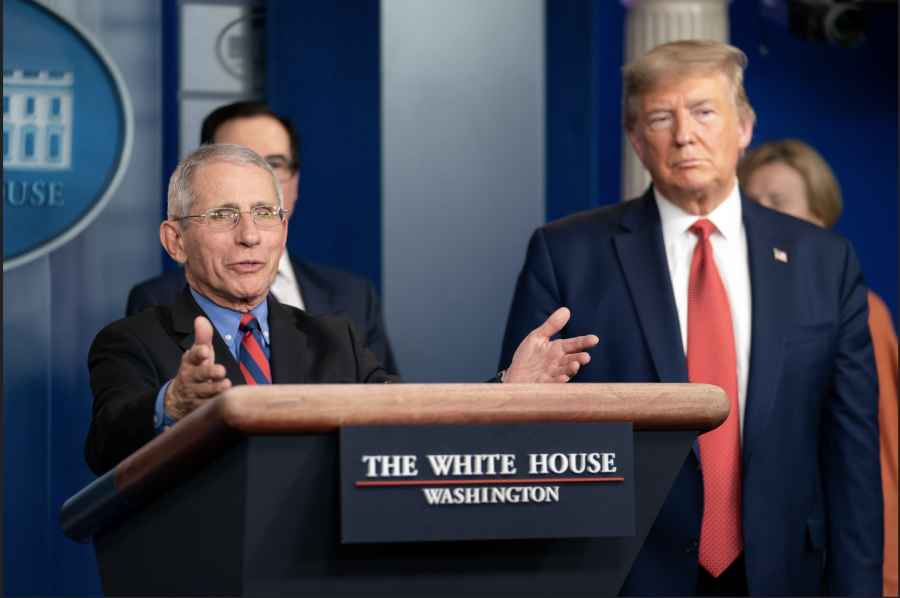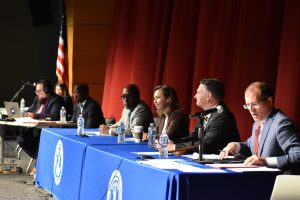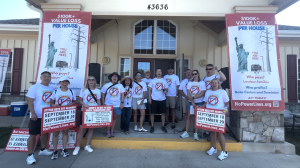Misinformation Throughout the COVID-19 Pandemic: How Republican Hard-Liners Advanced Their Dangerous Agenda
Throughout the COVID-19 pandemic, the nation’s top infectious disease specialists, researchers, and scientists worked tirelessly to provide United States citizens with updated, scientifically backed information. However, a portion of the country quietly ignored the research and recommendations, instead clinging to their so-called fundamental rights provided by the First Amendment while putting more vulnerable people at risk and listening to unqualified opinions and anecdotal evidence.
Public Domain image courtesy of Flickr
After serving as the director of National Institute of Allergy and Infectious Diseases since 1984, Fauci stepped down from his duties in December 2022. He is not retiring, however, and cites this as the next big step in his career.
March 3, 2023
In the midst of a politically charged COVID-19 task force briefing, where reporters shape their questions to fish for headlines and the administration attempts to not follow scientific guidelines, Anthony Fauci stood calmly by his presspodium, waiting to share the latest research and updates on the disease.
Throughout his 54 years serving in the National Institute of Health, Fauci has repeatedly encountered the roadblock of bipartisan divides and their effects on scientific guidelines and health policy. While the majority of politicians believe in evidence-based policymaking, or the use of accurate, unbiased research in making political decision making, the harsh bipartisanism within the government has exposed another side of the debate.
Though many Republicans disagreed with his and various officials’ recommendations during the most recent national health crisis, Fauci never hinted towards hidden political reservations.
Personal Predicaments
Often Republican hardliners and rigid conservatives, this large group of politicians carry their personal values into policy making, which often imposes their views on millions of citizens (who may not think similarly). During the COVID-19 pandemic, many right-leaning politicians ridiculed the use of a face mask to protect against the highly contagious virus, insisting that masking regulations infringed on their first amendment rights.
On July 8, 2021, Congresswoman Lauren Boebert (R-CO-03) tweeted a video of Former White House Press Secretary Jen Psaki providing more specific information regarding the recent CDC initiative to encourage vaccinations, equating CDC officials to “needle Nazis.” Psaki cited Mesa County, Colorado and Missouri as areas that were in need of assistance. Boebert claimed that this effort, which provided resources to areas with low vaccination rates amid the Delta variant surge meant that “Biden has deployed his Needle Nazis to Mesa County [Boebert’s district],” insisting that the the residents of the district are “more than smart enough” to assess whether to receive the “experimental vaccine and don’t need coercion by federal agents.”
However, referring to the CDC as “needle Nazis” is nothing but dangerous and degrading. Biden’s Administration worked tirelessly to deploy “response teams” which included CDC and the Department of Health and Human Services and the Federal Emergency Management Agency officials to help lead “vaccination and outreach,” never forcing anyone to receive the incredibly effective vaccine.
Even more alarming were the benefits of receiving the vaccine — two-dose vaccines have consistently shown to decrease rates of infection and were between 80-90% effective in preventing hospitalizations and deaths. Furthermore, during Sept. 2021, 77% of COVID-19 deaths were in unvaccinated individuals, with only 22.4% individuals who were vaccinated and/or boosted dying, with the benefit of vaccination slightly lessening due to decreased masking and the circulation of novel variants.
Historically, laws have been passed in an attempt to uphold public safety. In 1905, Jacobson v. The Commonwealth of Massachusetts upheld a required state vaccination law for smallpox as a “legitimate exercise of state police powers” despite opponents arguing this “interfered with personal liberties.”
With the help of vaccines, it has been over 73 years since the last active natural outbreak of smallpox in the United States, and the WHO declared the virus eradicated in 1980. Smallpox was previously a pandemic from 1870-1874 and was projected to kill about 3 in every 10 infected people.
According to the CDC, the vaccine helped provide immunity to 95% in preventing infection as well as “prevent or substantially lessen infection when given within a few days after a person was exposed” to smallpox.
On Dec. 20, 2020, the Pfizer vaccine was released under Emergency Use Authorization to adults over 16 during a time where the U.S. was experiencing 2,750 deaths a week (7-day average) and 214,415 total cases. During initial trials, the vaccine was reported to have 100% efficacy against hospitalization and 95% after two doses.
Despite this, many Republicans have pushed back against the effective vaccine, including right-wing conspiracy theorist and Georgia’s 14th district representative Marjorie Taylor Greene. In Nov. 2021, during a phone town hall, she finally admitted that she has not gotten the COVID-19 vaccine, claiming that she only publicly announced this because “it’s such an issue.” Widely known for spreading misinformation and dangerous theories, Greene has directly attacked the safety and usefulness of the COVID-19 vaccine.
On August 9, 2021, Twitter suspended Greene for one week after she violated the company’s rules. She tweeted that the FDA “should not approve the covid vaccines” because they were “failing” in reducing the virus’ spread.
In reality, the Moderna vaccine had a similar effectiveness as the Pfizer vaccine at 94%, with the Johnson and Johnson vaccine just behind at 72%. According to research published in the Commonwealth Fund, a private U.S.-based organization focused on inspiring a better healthcare system, the COVID-19 vaccines prevented an additional 3,255,656 deaths and 119,851,779 hospitalizations from Dec. 12, 2020 to Nov. 30, 2022.
Hardliners vs. Health Officials
Even with over 3,600 healthcare workers dying during the first year of COVID-19 on the frontlines, Republican hard-liners and MAGA enthusiasts dismissed the vaccine as a government-controlled microchip. According to a survey and poll conducted by YouGov and the Economist in 2021, 32% of Republicans and 20% of the American public are worried that the vaccine is a part of the government’s “microchip plot.”
Many false claims and statements have been circulated relating to microchips being implanted through the COVID-19 vaccine, but Fauci and other public health officials have disproved those even considering these claims. Facebook user Steve Bolin posted a red image with white text reading on May 19, 2020, “Dr. Fauci says every American should be microchipped. The only chip going in my body will have salsa on it.” The image has been hidden on Facebook and verified as false information by independent fact checkers.
Many politicians would retaliate against Fauci and his NIH colleagues through personal attacks by claiming he is being paid to spread lies about the virus. Such comments naturally inspired a portion of Americans to believe such lies. Former President Donald Trump oftentimes fueled this fire, repeatedly touting unsafe remedies for the virus from ingesting hand sanitizer to utilizing an unproven drug, hydroxychloroquine.
According to a study published in the National Library of Medicine, hydroxychloroquine “has shown efficacy” against COVID-19 some studies. On June 15, 2020, the FDA revoked the emergency use authorization for hydroxychloroquine following studies which did not show significant positive results. An FDA official stated that the decision to provide EUA in the first place was not a result of “scientific evidence, but to fervent advocacy of the drugs by Trump and other political figures.”
In a coronavirus task force briefing on April 23, 2020, an official presented research that demonstrated that sunlight, heat, bleach, and isopropyl alcohol were significantly effective in killing the virus in “saliva or respiratory fluids.” In response to this finding, Trump offered his opinion, encouraging research into injecting disinfectants to kill the virus. “And is there a way we can do something like that, by injection inside or almost a cleaning [to kill the virus]?” Trump asked, looking over to White House Task Force Coordinator Deborah Birx. “I’m not a doctor. But I’m, like, a person that has a good you-know-what.”
For the safety of citizens and clarification, many large sanitation companies and the CDC issued statements warning against ingesting such products, citing that “under no circumstance should [their] disinfectant products be administered into the human body (through injection, ingestion or any other route).”
Susceptible Supporters
In a CNN interview in January 2021, Fauci admitted that comments like this one from Trump and his Republican allies worried him and other public health officials that citizens would follow Trump’s advice. “You’re going to have people who hear that from the President and they’re going to start doing dangerous and foolish things,” Fauci said to CNN’s Erin Burnett.
Unlike this instance where Trump appeared to be acknowledging research and using his best judgment to assist the medical community in improving guidelines and conversation, Trump’s constant downplaying of the severity of the virus and masks’ effectiveness encouraged his followers to do the same.
Early in the pandemic, Trump insisted that the virus would disappear like a “miracle.” When the first few cases of the virus were confirmed in the U.S. on Feb. 26, 2020, Trump insisted that the cases wouldn’t spread much. As expected, however, numbers increased in the following weeks and by April 28, the U.S. hit 1 million covid cases.
Masks Mean Meekness
Another area of disagreement that displayed the disconnect between both sides of the aisle and spotlighted the minute importance placed on scientific recommendations was when Trump consistently mocked the use of masks, doubting their effectiveness, use, and style.
On April 3, 2020, after the CDC encouraged citizens to wear a face covering as an “additional voluntary public health measure,” Trump emphasized the optional nature of the recommendation, hinting towards the uncoolness associated with protecting communities. “So it’s voluntary,” Trump said. “You don’t have to do it. I don’t think I’m going to be doing it. I don’t know, somehow sitting in the Oval Office behind that beautiful Resolute Desk, the great Resolute Desk. I think wearing a face mask as I greet presidents, prime ministers, dictators, kings, queens — I don’t know, somehow I don’t see it for myself.”
On May 21, 2020 when touring a Ford plant, Trump claimed that he was wearing a mask “in the back area,” but removed it because he didn’t want to give the press “the pleasure of seeing it.” Such a comment implies that wearing a mask is applauded by most news outlets and likely a large percentage of citizens, yet, even though doing so was advised and backed by data, Trump went against professional advice. Such behavior translated to many of his supporters and MAGA Republicans to preach the same message: don’t wear a mask unless absolutely necessary because protecting the less vulnerable is not as cool as disobeying medical professionals.
Later that year, on July 19, Trump outwardly slammed research and guidelines to wear a face mask. “I don’t agree with the statement that if everybody wears a mask, everything disappears,” Trump said in an interview with Fox News host Chris Wallace. Although “everything” doesn’t “disappear” with the use of a face mask, they do significantly reduce the spread of the virus.
There were slight disagreements in instances like these where Trump went against medical guidelines and updated information, causing Fauci to face widespread public criticism.
Despite many individuals pushing for scientists and doctors to not be associated with politics, this sentiment inspires the dissemination of false, politically-benefitting information. Events like these and the general disagreement between politics and science during this time led Fauci to discover what he called the “depth of the divisiveness” in the U.S. However, he continued to lead during the pandemic, facing national criticisms, scrutiny, and even death threats, to supply the public with accurate information.


























![The Phoenix varsity volleyball team lines up for the national anthem. “We were more communicative [with each other] during this game, and I feel like we kept our energy up, especially after the first set,” senior Jessica Valdov said.](https://theblazerrhs.com/wp-content/uploads/2024/10/DSC_0202-1200x800.jpg)










![Junior Alex Alkhal pitches the ball. “[I] just let it go and keep practicing so we can focus on our goal for the next game to get better as a team,” Alkhal said.](https://theblazerrhs.com/wp-content/uploads/2025/05/DSC_0013-1-1200x929.jpg)
























